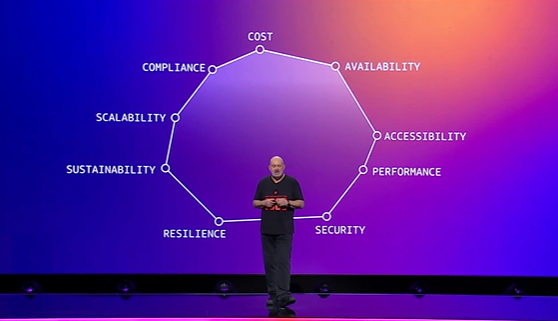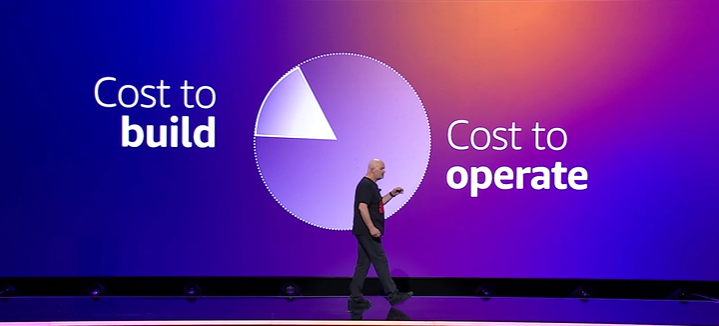Amazon's Vogels says 'cost awareness is a lost art' as AWS launches optimization tools
"Cost awareness is a lost art. We need to regain that art," said Amazon CTO Dr. Werner Vogels, speaking at Amazon Web Services' re:Invent conference. AWS also launched a new tool to manage application resources within the AWS Management Console as well as CloudWatch Application Signals to automatically instrument applications.
Vogels talk revolved around cost optimization of compute resources and aligning business and technology decisions. The keynote, which used multiple lessons learned from building AWS services, focused on being a frugal systems architect. By focusing on costs and continual improvement, Vogels argued enterprises can be more sustainable, evolve more quickly a nd pay down technical debt.
nd pay down technical debt.
The subtext of the talk also seems to indicate that AWS is leaning into its strengths of being a low-cost cloud provider. Enterprises have been optimizing cloud spending, consolidating vendors and focusing on efficiency. This optimization of cloud spending does not appear to be a passing fad.
As Vogels spoke, AWS launched Amazon CloudWatch Applications Signals in preview. The service automatically instruments applications to monitor latency, availability and performance. Amazon CloudWatch Applications Signals aggregates metrics, traces, logs, real user monitoring and puts together telemetry.
In addition, AWS announced the general availability of myApplications, which is part of the AWS Management Console. MyApplications provides a summary that analyzes costs, usage and resource usage across AWS.
Vogels argued that enterprises should be able to track costs throughout applications, web pages and data flows. "In AWS, each of the resources that you've been using, comes with a total associated cost of every single one of the surfaces. We know the cost of the whole system," said Vogels.
Other key cost points from Vogels chat:
- Cost is a close proxy for sustainability. "We pay for each individual resource we're using, and this is a pretty good approximation to the resources that you've used," said Vogels, who added that builders need to architect systems for sustainability. "We want to be frugal in a way that these resources are sustainable."
- Cost is a non-functional requirement. Vogels said building systems boil down to design, measure, and optimize. "The most important thing here is that cost needs to be a nonfunctional requirement. If you think about non-essential requirements, you know, there's all these sorts of classical ones: security, compliance, performance, reliability. But the ones that you have to keep in mind at all times. Sustainability should be another one.

- Align business and technology decisions as well as costs and revenue models. "Make sure that your business issues and the technology decisions are in harmony with themselves," said Vogels. If business and technology are aligned, you should be able to grow revenue while optimizing costs.
- Pay off technical debt. To design systems that can evolve you will need to pay off technical debt. Like economic debt, the interest compounds and at some point, crushes you, said Vogels. "You and I are creating technical and economic debt," added Vogels, who said enterprises have to continually retire tech debt.
Vogels argued that enterprises will need to build cost aware architectures that are continually optimized.
Werner also talked a bit about developer productivity in the age of generative AI as well as SageMaker features. He said there's a new age of developer productivity ahead, which incidentally also plays into cost optimization, and elaborated in a blog.
Constellation Research analyst Holger Mueller said:
"Long gone are the re:Invents when the Dr. Werner Vogels keynote had half of the announcements. The Amazon CTO has pivoted to developer and architecture best practices. Last year's key theme was all about moving to an event driven architecture (EDA) -- most roadmap items did not get delivered due to the focus on GenAI -- so this year was all about a focus on cost consciousness. At the same time it was up to Vogels to show where AWS will embed Q to help developers become more productive. Vogels balances the inherent fear of developers over AI replacing them with pointing out to the upside. Three product announcements made it to his keynote. Not bad for the cloud veteran, who is a developer favorite and maybe even an idol."
Here's the week from the Constellation Research team at re:Invent.
- Amazon's Vogels says 'cost awareness is a lost art' as AWS launches optimization tools
- AWS, ServiceNow ink 5-year collaboration pact
- These overlooked AWS re:Invent launches could solve pain points
- AWS launches Amazon Q, makes its case to be your generative AI stack
- AWS Expands Zero-ETL Options, Adds AI Recommendations for DataZone
- AWS presses custom silicon edge with Graviton4, Trainium2 and Inferentia2
- AWS bets palm reading will come to an enterprise near you
- AWS Introduces Two Important Database Upgrades at Re:Invent 2023
- AWS launches Braket Direct with dedicated quantum computing instances, access to experts
- AWS re:Invent 2023: Perspectives for the CIO | Live Blog
- AWS, Salesforce expand partnership with Amazon Bedrock, Salesforce Data Cloud, AWS Marketplace integrations

